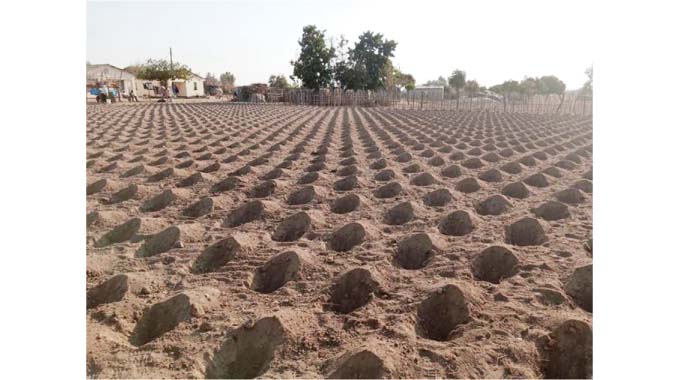Agriculture extension officers key to farming sector transformation

Nqobile Tshili, Chronicle Reporter
AGRICULTURE extension officers are key to the transformation of the country’s agriculture sector into agribusinesses through proffering solutions to farming communities.
Three extension officers are deployed per ward and this is meant to ensure that they are continuously in contact with farmers; each one attending to 600 farmers at most.
To ensure that agritex officers are hands-on and technically sound, they undergo refresher courses twice a year and also write examinations to show that they would have mastered concepts they have been taught in an ever-changing field due to climate change.
The officers are expected to provide technical advice to farmers as Government works to revolutionalise the agriculture sector into an industry starting in villages.
The Ministry of Lands, Agriculture, Fisheries, Water, Climate and Rural Development is leading the rural industrialisation programme where villages are being transformed to be more productive.
Agritex officers have been equipped with motorcycles to improve mobility and also get monthly airtime allowances to communicate with farmers on agribusiness opportunities.
The country is preparing for the 2022/23 farming season and meteorologists have projected a normal to above normal farming season.
Responding to questions from Chronicle, Lands, Agriculture, Fisheries, Water, Climate and Rural Development Permanent Secretary Dr John Basera said Agritex officers are the technical engines towards a successful implementation of Pfumvudza/Intwasa climate proof farming method.
He said Agritex officers are expected to be ever present in communities to provide farming solutions to farmers.
“Pfumvudza/Intwasa programme is a climate proofing concept that is anchored and enabled by a responsive agricultural extension support system manned by a well-rounded, polished agricultural extension officer whose role is as follows: introduce the concept and sensitise local traditional leaders on Pfumvudza/Intwasa programme, farmer mobilisation and registration and training farmers the principles underlying Pfumvudza; minimum soil disturbance/holing out, rotations, mulching,” he said.
Dr Basera said extension officers are expected to impart and promote adoption of climate smart agricultural practices that focus on soil moisture and nutrient conservation for increased production.

Pfumvudza/Intwasa programme
He said they can do this by organising farmers into groups and reduce the burden of individually digging Intwasa holes.
Dr Basera said farmers also have to share information on Pfumvudza through mobile-based interactive social platforms and arrange learning visits to successful programme implementers.
He said they are expected to identify and provide solutions in farming communities resulting in improved yields.
“Pfumvudza/Intwasa technically means a new season of producing more on less land, producing more from less other resources, thus making farming a business case. A new season of religiously adopting the principles of conservation agriculture to climate proof the food production sub-sector which is so vulnerable to climate change effects and building resilience as we journey towards vision 2030, agriculturally,” he said.
Dr Basera said for extension to be effective Government is continuously upgrading extension officers’ skills, knowledge and competencies through trainings tailored to meet farmers’ concerns such as taking farming as a business, climate change adaption, new pests and diseases.
He said the Agriculture Ministry runs several Trainings -of-Trainers (ToT) sessions targeting extension officers who are expected to pass knowledge to communities where they operate from.
“They will further cascade the knowledge gained to farmers. Farmers can seek advice (demand driven extension) or agriculture extension officers can proffer advice on what they see as they are part of the farming community at the lowest local level,” he said.
“The major roles of extension services provision is technical backstopping to farmers as well as agribusiness advisory. We consider our extension officers as agribusiness advisors and are the anchor agents of Agricultural Transformation and Rural Development.”
Dr Basera said in acknowledging the critical role of agriculture extension officers, President Mnangagwa made several interventions to ensure that they are well resourced to administer their duties.
He said they have been provided with motorcycles and fuel which enables them to reach all their targeted farmers per ward.
“They are allocated electronic gadgets/ tablets, monthly airtime and data bundles for ease of communication and receiving key extension information targeting farmers and they also get technical capacitation through online Inservice training. They undergo refresher modules every half year and sit for exams,” he said.
“Plans are at an advanced stage to give each officer an input demo pack they will administer themselves for skills capacitation. We intend to turn our extension officers into well-polished and technically aware agricultural practitioners.”
Dr Basera said Government has also implemented a robust monitoring and evaluation mechanism to ensure that the extension officers deliver on their duties.
“A system of reporting where weekly reports are submitted is another measure that ensures that agriculture extension officers execute and deliver their scheduled activities. There are various programmes that requires execution by agriculture extension officers and these have targets. Structures and processes have been put in place to monitor progress and reports are used to ascertain accountability and responsibility by implementing teams,” said Dr Basera.











Comments